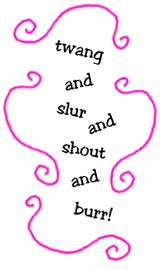 In 1945, Emily Post’s etiquette book offers pages of advice on words, phrases, and pronunciation. Read this selection carefully, and make sure you enunciate!
In 1945, Emily Post’s etiquette book offers pages of advice on words, phrases, and pronunciation. Read this selection carefully, and make sure you enunciate!
1945: How To Cultivate an Agreeable Speech
![]() The often-heard expression, “You know she is a lady as soon as she opens her mouth,” is not an exaggeration. The first requirement for charm of speech is a pleasing voice. A few singing lessons ~ even though you have no gift for music and will never sing a note ~ are of inestimable value in teaching you to place your speaking voice and in teaching you to breathe. A low voice ~ low in pitch, not in range ~ is always more pleasing than one forced up against the ceiling and apparently let out through a steam-vent in the roof! On the other hand, a voice uttered with so little strength that it threatens to be extinguished or so low as to be heard with effort is even more trying. Making yourself heard is chiefly a matter of enunciation; if you breathe properly and pronounce distinctly, a low voice carries well and delights a sensitive ear. Few people with loud voices have any idea that their steam-whistle screaming is not only ear-splitting but, in public, extremely bad form, as it attracts the attention of everyone within shouting radius.
The often-heard expression, “You know she is a lady as soon as she opens her mouth,” is not an exaggeration. The first requirement for charm of speech is a pleasing voice. A few singing lessons ~ even though you have no gift for music and will never sing a note ~ are of inestimable value in teaching you to place your speaking voice and in teaching you to breathe. A low voice ~ low in pitch, not in range ~ is always more pleasing than one forced up against the ceiling and apparently let out through a steam-vent in the roof! On the other hand, a voice uttered with so little strength that it threatens to be extinguished or so low as to be heard with effort is even more trying. Making yourself heard is chiefly a matter of enunciation; if you breathe properly and pronounce distinctly, a low voice carries well and delights a sensitive ear. Few people with loud voices have any idea that their steam-whistle screaming is not only ear-splitting but, in public, extremely bad form, as it attracts the attention of everyone within shouting radius.
As a nation we do not talk so much too fast, as too loud. Tens of thousands twang and slur and shout and burr! Many of us drawl and many others of us race tongues and breath at full speed, but, as already said, the speed of our speech does not matter so much. Pitch of voice matters very much, and so do pronunciation and enunciation, both of which are absolutely essential to the comfort of the listener.![]()
Source: Post, Emily. Etiquette: The Blue Book of Social Usage. New York: Funk & Wagnalls Company,1945.
~ p. 38 ~